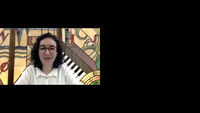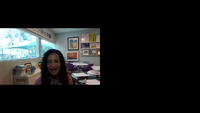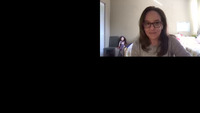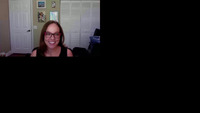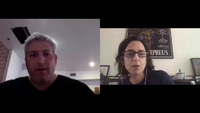Council of American Jewish Museums (CAJM) Collecting These Times Oral History Project
Item set
- Title
- Description
- Format
-
Council of American Jewish Museums (CAJM) Collecting These Times Oral History Project
-
An oral history interview project helmed by CAJM in partnership with other Jewish community organizations that recorded, collected, cataloged, diverse Jewish stories from the pandemic period.
-
Mpeg-4 video
Items
-
Mayor Dan Gelber Oral History Interview
Jewish Museum of Florida-FIU Education Manager Luna Goldberg interviews City of Miami Beach Mayor Dan Gelber. -
Beco Lichtman Oral History Interview
Jewish Museum of Florida-FIU Education Manager Luna Goldberg interviews Beco Lichtman, an expert facilitator of compassionate conversations about diversity. -
Rabbi Gayle Pomerantz Oral History Interview
Jewish Museum of Florida-FIU Education Manager Luna Goldberg interviews Rabbi Gayle Pomerantz, Senior Rabbi at Temple Beth Sholom, Miami Beach, FL. -
Asuka Mashav Oral History Interview
Jewish Museum of Florida-FIU Education Manager Luna Goldberg and FIU Department of Modern Languages Professor Andrea Fanta interview Asuka Mashav, Teaching Professor of Japanese, Coordinator, & Director of Study Abroad Program in Japan in Department of Modern Languages at FIU. -
Dr. Amy Paul Ward Oral History Interview
Jewish Museum of Florida-FIU Education Manager Luna Goldberg interviews Dr. Amy Paul Ward, Associate Professor at Florida International University. -
Naomi Davis Oral History Interview
Jewish Museum of Florida-FIU Education Manager Luna Goldberg interviews Naomi Davis, Miami Field Manager at OneTable. -
Dr. Oren Stier Oral History Interview
Jewish Museum of Florida-FIU Education Manager Luna Goldberg and FIU Department of Modern Languages Professor Andrea Fanta interview Dr. Oren Stier, Director of the Holocaust and Genocide Studies Program at Florida International University. -
Susan Gladstone Oral History Interview
Jewish Museum of Florida-FIU Education Manager Luna Goldberg and FIU Department of Modern Languages Professor Andrea Fanta interview Susan Gladstone, Executive Director of the Jewish Museum of Florida-FIU. -
Jon Warech Oral History Interview
Jewish Museum of Florida-FIU Education Manager Luna Goldberg and FIU Department of Modern Languages Professor Andrea Fanta interview Jon Warech, Director of Hillel at Florida International University. -
Mason Duboff Oral History Interview
Jewish Museum of Florida-FIU Education Manager Luna Goldberg interviews Mason Duboff, Jewish Educator and Cantorial Soloist. -
Rachel Harvith Oral History Interview
Rachel Edwards Harvith is Director of the Arts, Media, and Communications Career Community Center for Careers, Life, and Service at Grinnell College. In this interview she shares information about her family, her Jewish history, and the various paths that brought her back to Grinnell, Iowa. She articulately describes how the Covid situation was handled early on and what has developed since then both at the university and within her life. She shares personal stories about her pregnancy, parenting of her son, striving to stay healthy both physically and mentally. She says that it is hard being a Jew in Grinnell as any synagogue is over an hour away and that Covid precautions prevented some important family gatherings concerning her newborn son. She speaks of antisemitism and the overall lack of awareness from most Iowans. Rachel gives examples of how she maintains her Jewish traditions and values. She is currently on the rabbi search committee for Charverim, the college's student Jewish organization. -
Dawn Oropeza Oral History Interview
Dawn Marie Martinez Oropeza is a Latinx Jewish woman, born and raised in Des Moines with a mix of Jewish and Catholic influences. In this interview, Dawn talks about her family background, the deep connections to the Jewish community through her maternal grandparents, and how, after years away, she came back to Des Moines with her husband, Juan Carlos, to raise their family. Dawn is an artist, an activist, an administrator, and board member of the Iowa Jewish Historical Society. -
Sally Frank Oral History Interview
Sally Frank is a law professor at Drake University, a graduate of Princeton Law School, and the current staff advisor for the Drake Hillel student group. In the interview, Sally discusses her experiences transitioning to remote work for her<br>university classes and seminars, the Drake Legal Clinic, and the many local, regional and national organizations with which she is active. These include legal groups, Jewish and non-Jewish organizations. She tells of her daughter and she both getting Covid and how she was able to continue working and serving her communities remotely through Zoom and YouTube. . She talks about virtual communities she’s been a part of during the COVID-19 pandemic, including a Jewish women's, her alumni reunions. Sally discusses how her activism and coping strategies throughout the past 20 months kept her connected and living her Jewish traditions and values. She ends her interview comparing this Covid pandemic to that of the early 20th century Spanish Flu pandemic, being grateful that in this time we had the technology and tools that allowed us to communicate and connect. -
Jenny Kitsis Oral History Interview
Jenny Kitsis, a Jewish Federation of the Quad Cities employee, is interviewed by Art Pitz. She shares how Covid-19 and other events of 2020-21 affected her job of providing services for the area's Jewish senior citizens. To protect her own family, she had a clearing and cleansing routine that she went through during the initial months of the pandemic. Jenny was interviewed on March 17 2021 by an Iowa Jewish Historical Society member for the Collecting These Times project in collaboration with the Council of American Jewish Museums. She signed the standard release form and there are no restrictions on this interview. -
Moze Thurmgreene Oral History Interview
Moze talks briefly about his family background and growing up in the San Francisco Bay area. He choose going to Grinnell University because of their academics and basketball program for which he plays guard. He identifies his family as West Coast Jews, primarily living their Judaism in the home and going to synagogue for the holidays. Moze talks about the chaotic way the school closed and how difficult it was finishing that year at home where it felt more like high school than college. He shares how he was exposed to Covid when his roommate tested positive and tells of the Covid protocol the school currently uses. Moze identifies some subtle antisemitism he's experienced and talks about some Jewish features he has and that he like which fit a Jewish stereotype: dark features, curly hair, a strong nose. He was returning to Iowa when the derecho hit and saw the damage in Grinnell. Moze participated in protests in San Francisco after the George Floyd murder. He sees being an ally as important. -
Naomi McCormick Oral History Interview
Naomi McCormick lives in Cedar Falls, Iowa and is a retired clinical health psychologist. She grew up in a secular Jewish, inner-city Chicago household as an only child of a social worker and an industrial quality control inspector. Naomi talks about her education, meeting her husband, lived in Plattsburg, NY for 20 years and then moved to Iowa when her husband began teaching at the University of Northern Iowa. She shares how being part of the Jewish Community was important at different times in her life and how she became more involved with the Sons of Jacob Synagogue later in life. <br>She became aware of Covid-19 in March 2020 when they traveled to New York for a wedding and there were so many restrictions. Back in Iowa they didn't personally feel the economic, emotional impact of the pandemic as many others because she and her husband are retired and prosperous. She talks about ways she copes: walking around her neighborhood with a friend, going to nature areas to draw while her husband does photography, makes more phone calls and family Zoom connections, plus goes online for a monthly Sons of Jacob zoomed service and a weekly Shabbat Club. In the SOJ congregation she notes there's a range of reactions and opinions about the disease, vaccinations, wearing masks, and many people are anxious. She tells how she just missed being caught out in the derecho as she drove back from a medical appointment near Iowa City. She shares about her involvement with several interfaith groups who address racial injustice issues and work toward equity. A mural about civil rights painted by youth from Waterloo Center for the Arts was defaced; she helped repaint it. She also talks about antisemitic incidents she experienced in her neighborhood, at some art classes, and within her clinical psychology practice. Although she did not attend any rallies for Black Lives Matter or to protest George Floyd, she helped organize a letter writing campaign for improved the health and safety conditions at the Tyson Foods Waterloo facility and to protest plant managers betting on the number of employees to get Covid. When asked what give her hope, she answered with what gives her meaning: a purposeful life which for her is caring for other people, helping, educating them, and being educated, too. She wrapped up her interview saying, "We need to find common ground and be respectful" -
Sarah B Licht and Lila Podgainy Oral History Interview
In this group interview, two Grinnell University students talk about their involvement with the Jewish student group Charerim: Sarah is the group's social chair and Lila is the cultural chair. They give examples about when and how Covid-19 disrupted their studies, and also how they grew because of the various adaptations they had to make within their family, their college friendships, study patterns, and continuing Chaverim connections. Lila talked about her job with NextGen in calling Iowans for a voter registration effort, going to protests for racial justice in New York City. Sarah was with family near the northeastern Florida coast and they reconnected with an area synagogue. -
Temple Bnai Jeshurun Short Story Book Club Oral History Interview
Several members of the Temple B'nai Jeshurun Short Story Book Club gathered to share their Covid-19 experiences and to talk about their involvement in the Des Moines Jewish community. They spoke about the ways Covid-19 affected their Jewish Community, them individually, and the nation. Iowa Jewish Historical Society Director Sandi Yoder interviewed Loretta Finger, Linda Cohen and Judy Deutch for the Collecting These Times oral history project. -
Terri Bensky Oral History Interview
Terri (Theresa Rochelle) Bensky is a psychotherapist who lives in Lorimor, a small town in southern Iowa, Union County. She describes how the Covid-19 pandemic impacted her, her work, and her family. At times she feels like an exile as the only Jew in her area and she talks about how sad her daughter and she were at not being able to come up to Des Moines for a Pesach seder this year. -
Dr. Gary Bremen Oral History Interview
Dr. Bremen talks about being a member of the Tifereth Israel Synagogue Medical Advisory Board, working in an urgent care clinic, the impact of the pandemic on his medical practice, his Jewish experience, and his family. He maintains his positive attitude throughout the pandemic, in response to events such as George Flyod's traumatic death, the Black Lives Matter protests, and the national civil unrest surrounding the 2020 presidential election. He also talks about how his father was a pivotal figure in his life and that he hopes the Jewish value of Tikkun Olam continues with and through his extended family. -
Anna Schecter Zigler Oral History Interview
Interview with Anna Schecter Zigler, NBC News Senior Producer. -
Joel Titleman Oral History Interview
Interview with Joel Titleman, owner of Mile End Deli, in Brooklyn, NY. Joel talks about his wife, (and entire family) an emergency room doctor, pregnant at 36 weeks coming down with COIVD, going to Canada to have the baby, and having a Zoom naming ceremony. Jewish values, feeding Jewish food, the community, his background, BLM, healthcare, shabbat and more. -
Cindy Greenberg Oral History Interview
Interview with Cindy Greenberg, CEO Repair the World -
Joan Nathan Oral History Interview
In this interview, Joan talks about her experiences during the pandemic. She discusses traveling to visit her daughter in New Orleans in March of 2020 and ending there for 53 days before she was able to return home. She discusses a few ingredients that were difficult to come by as a result of the pandemic, and she talks about testing over 100 recipes for a new memoir she has written - a memoir she was able to finish because of the quiet time afforded her during the pandemic. -
Barnet Kessel Oral History Interview
Thea and Barnet speak about Congregation Kehillath Israel and how their incredible transition to virtual programming and services has faired over the past 10 months. They discuss the High Holidays, the re-introduction of in-person programming, and how KI has served as a resource for its community in several different ways.
